
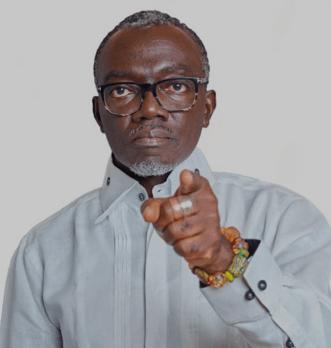

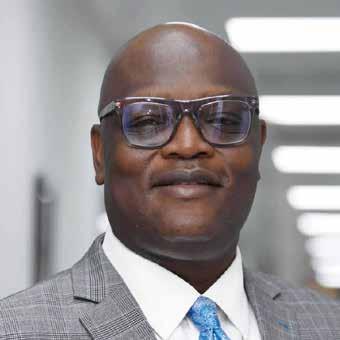

Professor Douglas BOATENG






Professor Douglas BOATENG
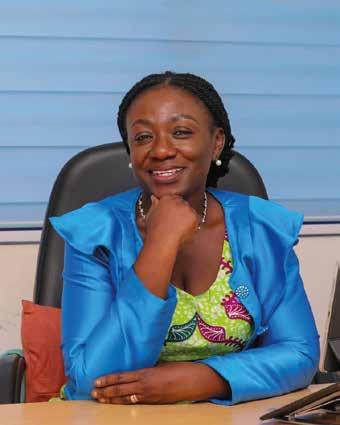
Rhoda Appiah, Head of Communications and Public Education at the Food and Drugs Authority (FDA), has called on Micro, Small & Medium Enterprises (MSMEs) in Ghana to embrace regulatory compliance as a critical enabler of trade and competitiveness. Mrs. Appiah noted that the inability of MSMEs to meet international standards locks Ghanaian products out of export markets and deprives the country of much-needed foreign exchange. She said, “If our foods do not meet
international standards, we cannot export and we lose the chance to earn vital foreign exchange.”
However, by perceiving regulatory compliance not as a bureaucratic bottleneck but as a tool for economic empowerment, Mrs. Appiah maintained that MSMEs could identify the right support, enabling them to compete, grow, and attract crucial foreign exchange for national development.
Mrs. Appiah made these remarks during a UK-Ghana Chamber of Commerce (UKGCC) webinar held in collaboration with WTS Nobisfields, under the theme “The Role of the Food and Drugs Authority (FDA) in Promoting Local and International Trade.”
Progressive Licensing: A Bridge, Not a Barrier
The FDA’s Progressive Licensing Scheme (PLS) emerged as a cen-
tral theme during the webinar. Designed to help micro and small enterprises enter and scale within the formal economy, the PLS allows businesses with limited capacity to begin operations under basic compliance and improve step by step.
“Compliance doesn’t have to be intimidating,” said Esther Amufa, also of the FDA. “The scheme allows businesses to meet regulatory standards gradually through pink, yellow and green stages each building toward full compliance without overwhelming financial or logistical pressure.”
Through this approach, the FDA has registered over 10,500 products and licensed more than 2,300 facilities since 2019.
Buy Ghana, Love Ghana: Local Brands, Global Standards
The PLS is closely
tied to the Buy Ghana, Love Ghana campaign, which encourages major retailers to showcase FDA-compliant local products. This initiative has improved visibility and consumer trust in Made-in-Ghana goods, and enhanced market access for MSMEs.
According to Miss Amufa, “We’ve partnered with supermarkets like Palace Mall to create dedicated shelves for local products, especially during festive seasons. But we also provide training on packaging, barcoding, and labelling everything needed to be retail-ready.”
Infrastructure, Innovation and Global Partnerships
The FDA, now over 28 years old, is internationally recognised and ISO-accredited, with the largest scope of accredited testing laboratories under one roof in Africa. Its work is bench-
marked by WHO standards and supported through collaborations with the European Medicines Agency, the African Vaccine Regulatory Forum (AVAREF), and NEPAD. Mrs. Appiah added that FDA’s operations span Ghana’s seaports, airports, and border posts, facilitating efficient regulation of imports and exports, and ensuring consumer protection across the supply chain. The authority is also embracing digital transformation, with an AI-powered registration system and a soon-to-be-launched one-stop harmonised certification portal in collaboration with the Ghana Standards Authority (GSA)
Moderated by Theophilus Tawiah, Managing Partner of WTS Nobisfields and law lecturer at UPSA, the webinar forms part of UKGCC’s ongoing series on regulatory reform and competitiveness of businesses in Ghana.

It begins as a pit in the earth but ends as an open grave of poisoned rivers, contaminated farmlands, a public health crisis, and compromised national sovereignty. Ghana’s illegal gold mining crisis, known locally as Galamsey, has long since morphed
beyond a criminal economy. What started as artisanal panning has grown into a conservatively estimated billion-dollar shadow industry.Savings and budgeting toolsHerbal medicine conference
Armed with excavators, mercury, drones, and for-
eign financing, Galamsey now extends beyond environmental degradation. It is hollowing out rural economies, undermining institutions, and jeopardising the future of Ghana’s next generation. Despite years of high-profile task forces, Operation Vanguard, Halt, NAIMOS and thousands of arrests since 2016, the devastation persists. The machines return. The rivers darken. And the people continue to suffer. The uncomfortable truth? The government cannot win this war alone. This is not just a law enforcement challenge. It is a societal failure, a governance vacuum, and a humanitarian emergency whose cost will be paid most painfully by the unborn.
Polluted waters,
contaminated lands – the consequences for tomorrow
By Professor Douglas BOATENG !
In Ghana’s Eastern and Western regions, rivers such as the Birim, Pra, Ankobrah, and Offin have become channels for sludge, mercury, and cyanide. The Ghana Water Company warns that the country may soon be forced to import clean water. Craters replace cocoa farms. Cattle herders search for safe watering spots. Fishing communities net silt. Boreholes yield chemically contaminated water. When water is undrinkable and soil is infertile, no food grows, no meat survives, and no nation stands. Ghana, once a regional symbol of food and water security, is edging dangerously close to ecological insolvency.Savings and budgeting tool-
sHerbal medicine conference
Foreign hands, local assistance and silence
The most painful irony is this: the worst perpetrators could never commit such acts in their own countries. Foreign-backed syndicates, often better resourced than local law enforcement, violate Ghana’s environmental integrity in ways unthinkable under the laws of their own countries. But they do not operate in isolation. The sad and unfortunate reality is that a network of local, complex, and self-serving collaborators enables them:
Citizens who stay silent out of fear or financial gain
Chiefs who lease sacred land Security officers who turn a blind eye
Politicians who benefit from the pro-
ceeds
The inconvenient truth – These foreign actors will depart with full pockets. Ghana will remain behind with poisoned wells, collapsing ecosystems, and a generation born into illness. This is not merely illegal mining. It is the commodification of Ghana’s soul, exported piece by piece for someone else’s wealth.Herbal medicine conference
The unseen cost – a major long-term health crisis in the making
Across mining regions, clinics report increasing cases of mercury poisoning, respiratory illnesses, miscarriages, and neurological damage, especially among children and pregnant women. These toxins won’t appear at polling stations, but they will show up in special-needs classrooms, overstretched hospitals, and across generations of poverty. Galamsey isn’t just damaging the terrain; it is quietly altering the nation’s biology. This
isn’t merely a rural problem; it’s a national breakdown. Ghanaians may not see the full cost now, but in twenty years, hospitals, schools, and the economy will feel the burden of our neglect.
Illegality cannot be solved by the government alone
Intent is not the problem. From President Kufuor’s early concerns to President Mahama’s directives and President Akufo-Addo’s vow to stake his presidency, and again under President Mahama, governments have tried and continue to give it their best shot. Operations have been launched. Equipment seized. Statements made. Yet within weeks, the same sites reopen.Savings and budgeting tools
Galamsey survives not because of a lack of law, but because it thrives in the spaces between policy and practice, protected by patronage, desperation, and silence. No bulldozer can uproot complicity. No law alone can
erase systemic apathy. The real fight lies in civic morality and collective courage. This crisis will not be resolved from Accra. It must be fought in the villages, churches, schools, and chief palaces.
The key to stamping out this criminality is a citizen-government partnership
The government can’t stop Galamsey alone; it’s now embedded in Ghana’s social economy, driven by poverty, greed, materialism, and silenced, with fragmented accountability protecting it. If just 300,000 Ghanaians (~1% of the population) mobilised as whistleblowers and community defenders, it could disrupt the criminal ecosystem. Alerts, tips, reclamation, and exposure; these are acts of citizenship.
When citizens lead, change happensHerbal medicine conferenceSavings and budgeting tools
In 2023, a teacher
in the Ashanti Region filmed Galamsey activity near a school. The footage went viral. Within days, the operation was shut down. In the Western Region, a grandmother rejected a GHS 5,000 bribe and reported a night-time syndicate. Their equipment was seized. In Upper Denkyira, youth barricaded access routes and turned a destroyed pit into a plantain farm. These victories were not engineered by the government. They were acts of ordinary people rising above fear and fatigue.
Traditional authority – between reverence and relevance
Chieftaincy remains one of Ghana’s most revered institutions. However, it is at risk of becoming irrelevant. No stool should lease ancestral land to destroy it. No palace should shield perpetrators. No elder should claim ignorance. A chief who profits from Galamsey is not preserving culture. He is auctioning it. It is
time for the chieftaincy to reclaim its moral capital not through ritual alone, but through custodianship of water, land, and posterity.
The economic mirage
Some defend Galamsey by citing unemployment. But the trade-offs are devastating : Savings and budgeting tools
Jobs that poison workers
Income that destroys forests
Gold that fuels corruption
This is not development. It is short-term cannibalism and criminality promoted by the self-serving short-termist and the ignorant as a solution to unemployment and poverty. And when the gold is gone? They will leave with full pockets. Ghana will stay with poisoned wells, broken forests, and children born into sickness.
The global investment dimension
For Ghana, one of Africa’s largest gold producers and a key player in cocoa and critical minerals, the implications extend
beyond the environment. Investors are paying close attention. As ESG metrics increasingly influence global capital flows, Ghana risks reputational damage that could discourage responsible investors.
Multinationals involved in extractives or agriculture face social licence risks if they are seen to operate near or profit from illegal activities. Export partners, particularly in Europe, are tightening supply chain traceability laws, such as the EU’s Corporate Sustainability Due Diligence Directive (CSDDD). Galamsey also jeopardises the AfCFTA ambitions by eroding trust in cross-border regulatory frameworks. The real risk? Ghana could become a warning example of resource-rich nations losing control over their natural assets.
The price of inaction is calculable and catastrophic
If current trends persist:
Ghana may spend over US$2 billion annually on water purification by 2035
Cocoa exports could decline by 30percent, destabilising rural economies
Mercury and cyanide exposure could spark a multibillion-dollar public health disaster
Climate resilience will vanish as forest cover erodes and river systems collapse
And when the gold is gone? What will remain are poisoned rivers, infertile land, hollowed economies, and futures traded for foreign profit at the expense of Ghanaians.
From spectators to stakeholders – citizenship reimagined
Governance is not the government’s job alone. It is a shared moral contract.
Teachers must teach sustainability, not silence
Religious leaders must preach stewardship, not indifference
Journalists must expose, not excuse Chiefs must lead, not lease
Citizens must hold
leaders and themselves accountable A nation does not only die when its rivers dry and lands get polluted, but when its people no longer care.
A new governance model – bottom-up, not top-down
Galamsey presents a warning and a model for African governance. It proves the limits of centralised solutions and the power of local legitimacy. Imagine:
Each District Assembly hosting youth-led reclamation squads
Public environmental dashboards tracking degradation and enforcement
Restoration funds co-financed by the state and community, monitored transparently
This is not idealism. It is strategic realism in a context where state capacity must be matched by civic muscle.
Conclusion –reclaiming a nation from within
This is not just a call to action. It is a call to conscience. Enough talk. Enough platitudes. Enough silence. Let the teacher speak. Let the chief act. Let the mother protest. Let the youth organise. Let the journalist expose. Let the citizenry punish. Because the boardroom is too far. The village is too near. The river is too sacred. The land must be protected. And the time is too short. Let history not record that we watched our rivers die and lands polluted while foreign criminal syndicates and local self-centred lawbreakers thrived. Let it say that we rose not with weapons, but with will. That we reclaimed not just the land, but our dignity. That we fought not just for gold, but for Ghana. And let it be said that when the unborn child cried from the future, we answered.
>>>the writer is a globally celebrated thought leader, Chartered Director, industrial engineer, supply chain management expert, and social entrepreneur known for his
transformative contributions to industrialisation, procurement, and strategic sourcing in developing nations.
As Africa’s first Professor Extraordinaire for Supply Chain Governance and Industrialization, he has advised governments, businesses, and policymakers, driving sustainability and growth. During his tenure as Chairman of the Minerals Income Investment Fund (MIIF) and Labadi Beach Hotel, he led these institutions to global recognition for innovation and operational excellence. He is also the past chairman of the Public Procurement Authority.
A prolific author of over 90 publications, he is the creator of NyansaKasa (Words of Wisdom), a thought-provoking platform with over one million daily readers. Through his visionary leadership, Professor Boateng continues to inspire ethical governance, innovation, and youth empowerment, driving Africa toward a sustainable and inclusive future.
By Eugene Davis

Transport, Joseph Bukari Nikpe, has reaffirmed the government’s commitment to providing both financial and non-financial incentives to accelerate the adoption of electric vehicles (EVs) in Ghana.
Appearing before Parliament to respond to a question on the timeline for implementing these incentives outlined in Section 5.1.1 of Ghana’s Electric Vehicle Policy Mr. Nikpe emphasized that these measures are central to achieving sustainable transportation goals.
He noted that the first phase of the
roadmap, which spans from 2024 to 2026, is focused on establishing these incentives to support the rollout of electric vehicles across the country.
“As part of our commitment, the government has already operationalized provisions under the Value Added Tax Act, 2013 (Act 870), as amended by Act 1107 in 2023, which exempts electric vehicles imported for public transport from VAT,” he stated.
He further disclosed that plans are underway to review the Road Traffic Regulations, 2012 (L.I. 2180), to
accommodate the evolving electric vehicle ecosystem in Ghana.
Section 5.1.1 of the Electric Vehicle Policy, as highlighted by the Energy Commission, provides the regulatory framework for integrating renewable energy and establishing EV charging infrastructure. This includes setting national standards for fast-charging networks, conducting grid impact assessments, and promoting smart charging schemes to reduce pressure on the national grid.
The policy also outlines a national
strategy for the recycling, reuse, and environmentally safe disposal of EV batteries, ensuring the long-term sustainability of the sector.
Globally, the electric vehicle market has witnessed significant growth from 400,000 EVs in 2013 to over 16.4 million in 2021. According to the International Energy Agency (IEA), light-duty plug-in electric vehicles are projected to reach 140 million units by 2030, with electric two- and three-wheelers hitting 490 million.
In Ghana, the 2022 Electric Vehicles Baseline Survey Report by the Energy Commission revealed that between January 2017 and December 2021, approximately 17,660 plug-in electric vehicles were imported into the country. Additionally, 9,431 motorized electric two- and three-wheelers
were imported during the same period 98% of which were Battery Electric Vehicles (BEVs) primarily from China.
Data from the Ghana Revenue Authority (GRA) in 2021 further showed that standard hybrid electric vehicles (HEVs) accounted for the largest share of total EV imports at 91.5%, followed by BEVs at 5.1% and plug-in hybrid electric vehicles (PHEVs) at 3.3%
Electric vehicles available on the Ghanaian market are broadly categorized into Pure Electric Vehicles (BEVs), Hybrid Electric Vehicles (HEVs), and Plug-in Hybrid Electric Vehicles (PHEVs).
The government remains optimistic that through a combination of legislative support, tax incentives, and infrastructure development, Ghana can accelerate its transition to a cleaner and more sustainable transport system.

The Ghana Investment Promotion Centre (GIPC) will tomorrow, 10th July
2025, launch the Investment Opportunity Mapping Project (IOMP), a
landmark initiative aimed at unlocking untapped investment potential
across all 261 districts in Ghana’s 16 regions.
This marks the first time a comprehensive, district-level investment mapping exercise is being undertaken in the country.
Under the leadership of GIPC's Chief Executive Officer, Mr. Simon Madjie, the IOMP seeks to identify, assess, and document viable opportunities at the local level, offering data-driven insights to guide both domestic and foreign investment in key sectors such as agribusiness, manufacturing, tourism, energy, and services.
The initiative aligns with broader national efforts to stimulate job creation and drive sustainable economic development.
The President, John Dramani Mahama has prioritised policies that promote industrialisation, infrastructure development, and digital transformation critical pillars in building a competitive, investor-friendly business environment.
The IOMP is being implemented in partnership with the Ministry of Trade and Industry, the Ministry of Food and Agriculture, and the Ghana Export Promotion Authority (GEPA).

By Eugene Davis

lins Adomako-Mensah, has emphasized that the Akoma and Eban oil discoveries were made under the Akufo-Addo-Bawumia administration, as part of a deliberate reserve replacement strategy.
Speaking at a Minority press conference to set the record straight on ENI’s Eban-Akoma discoveries, Mr.
Points Block 4 under a Petroleum Agreement with ENI. In accordance with the agreement, ENI duly notified the Ministry of Energy, Petroleum Commission, and GNPC, with the discoveries also reported in the local media.
He described attempts by the Ministry of Energy and Green Transition to attribute
est, disingenuous, and a distortion of the truth.” The NPP Minority, he said, firmly rejects any such claims.
:
Akoma-1X Well: Drilled by ENI Ghana in 2019 with approval from the Petroleum Commission. Discovery of gas and condensate announced on 9th May 2019.
Eban-1X Well: An-
other significant oil discovery by ENI, made in 2021 in the
To fulfill its contractual obligations, ENI requested and received approval from the Akufo-Addo-Bawumia government to conduct a joint appraisal for both discoveries now termed the Eban-Akoma Complex to cut costs and speed up development. This approval was granted on 28th July 2022.
Following a success-
ful appraisal, ENI confirmed the discoveries as commercially viable and formally informed the Ministry of Energy and Green Transition, as required by the CTP Block-4 Petroleum Agreement.
Mr. Adomako-Mensah further revealed that between 2018 and 2022, seven (7) discoveries were made from six (6) wells, including two from the Aprokuma-1X Well at the Albian and Cenomanian levels.
The Minority stressed that in Ghana’s upstream petroleum sector, only the contractor in this case, ENI can declare commerciality, and that such milestones stem from sustained planning over time, not short-term political efforts.
The NPP Minority therefore maintains that credit for the Akoma and Eban discoveries rightly belongs to the Akufo-Addo-Bawumia administration.

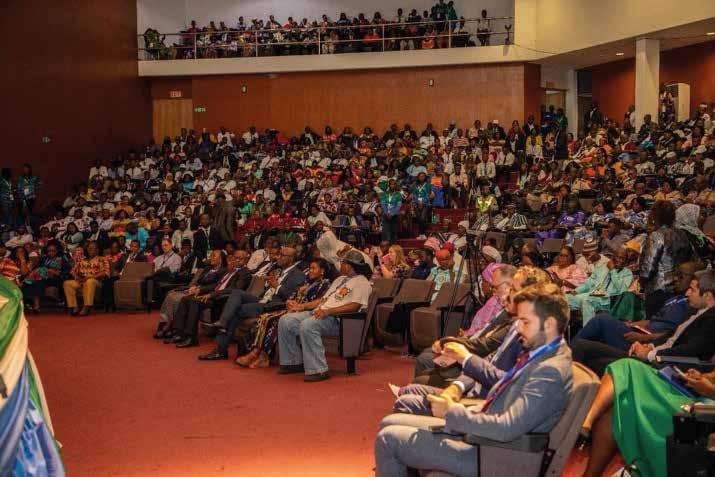
A cross section of participants present at the 7th edition of the Strengthening Families Conference (SFC) 2025
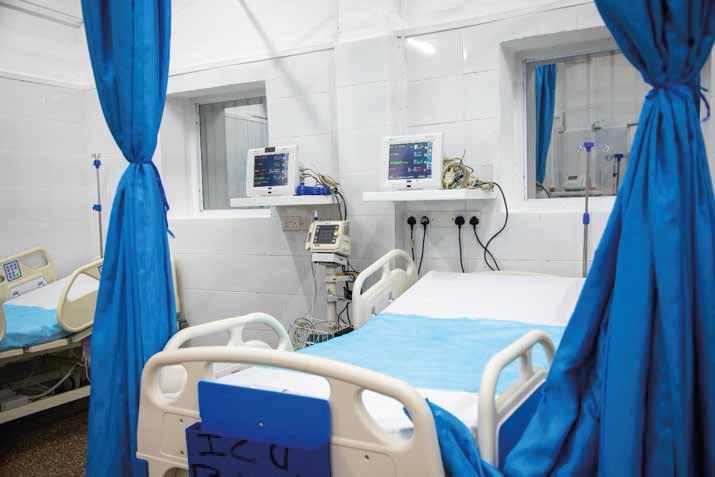


has donated over 1,500 books to two public schools in the Central Region to promote literacy and support foundational education.
This initiative, launched in the Central Region of Ghana, is part of the Bank’s flagship literacy campaign, “Formative Learning with CBG.” The beneficiary schools include St. Francis Catholic Primary School in
tion ceremonies, Managing Director of Consolidated Bank Ghana LTD, Dr. Naomi Worlali Kwetey, reiterated the Bank’s commitment to investing in early education and nurturing future leaders through reading.
“Education is the key to opportunity. Through this initiative, we are empowering children with the tools to read, grow, and dream
dreams and futures of every child present. Every great dreamer started as a reader, and the knowledge you gain today will empower you to shape your future,” she added.
Dr. Kwetey acknowledged the tireless efforts of teachers, describing them as key partners in shaping young minds and building a
more literate and
Present at the events were the Deputy Managing Director of CBG, Madam Sheila Azuntaba and the Head of Corporate Communications, Madam Mavis Frempong, who joined the team in engaging pupils during classroom reading sessions. The visits were marked by lively interactions and enthusiastic participation by students, many of whom expressed their excitement
about the new books.
The headteachers of the school expressed appreciation to CBG, noting the impact the books would have on improving reading skills and academic performance.
Formative Learning with CBG is an initiative that targets schools in underserved communities, supporting CBG’s CSR strategy, which focuses on the pillars of education, health, and community development. The books distributed under the programme are locally sourced from the Ghana Publishing Company and Afram Publications Limited, ensuring culturally relevant and age-appropriate content.
The initiative aligns with Sustainable Development Goal 4 –Quality Education, supporting the Bank’s role in fostering inclusive and equitable access to learning across Ghana.
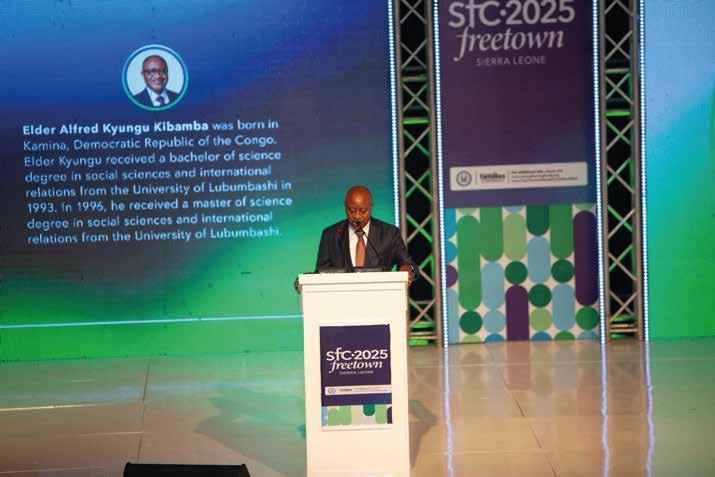
resilient communities. We need more women of virtue, purity, and empowerment, and this begins with the
Families Confer ence (SFC) 2025 unfolded in Freetown as The Church of Jesus Christ of Latter-day Saints and collaborators joined government leaders, faith communities, and civil society to champion women’s empowerment and child protection across Sierra Leone. The two-day conference officially opened on Thursday, June 26 at the Bintumani Inter-
the theme ‘Build ing Stronger Communities through Women Empowerment and Child Protection’.
Delivering the keynote address on the first day, Her Excellency the First Lady of the Republic of Sierra Leone, Madam Fatima Maada Bio, stated that the conference presented a unique platform to drive lasting change and consequently challenged stakeholders to turn dialogue into
us all to not let this be just a conference. Let us use this platform to design policies that will make women change-makers in our society,” she urged. She emphasized that promoting women’s empowerment should not be reduced to tokenism, as genuinely empowering women has tangible and far-reaching effects.
“Women are agents of transfor-
our families are what build up our society,” the First Lady added.
Representing The Church of Jesus Christ of Latter-day Saints, Elder Isaac K. Morrison, General Authority Seventy and Second Counselor in the Africa West Area Presidency, echoed this conviction, highlighting the role of women in the home and across various facets of society.
“Women create harmonious and
Other dignitaries reinforced the shared mission. Archbishop Edward Tamba Charles, President of the Inter-Religious Council, described empowerment as a spiritual responsibility, and consequently, must be spearheaded by religious institutions. “Religious institutions must champion gender equality and child welfare,” he noted.
Traditional leader Sheku Amadu Tejan Fasuluku-Sonsiama III similarly said, “It is in our homes, towns, and villages that true transformation must begin. When women are given a seat at the table, nations prosper.”
Goodwill messages came from Ambassador Bob Sheriff of Liberia and Amir Musa Mewa of the Ahmadiyya Muslim Mission, in a show of

regional solidarity. The first day also featured an exhibition showcasing solutions in family welfare, women’s advancement, and child protection, along with a panel discussion led by Madam Isatu Jabbie Kabbah and Aminata Turay exploring policy and grassroots strategies.
Child protection at the heart of resilient communities
The second day of the conference turned the spotlight to child protection as the cornerstone of strong families.
Delivering the keynote, Elder Alfred Kyungu, President of the Africa West Area of The Church of Jesus Christ of Latter-day Saints, underscored the benefits of dedicated care for the young. “Children are shaped by their experiences; hence, families must create a conducive environment that contributes not just to their physical well-being but to
their emotional and spiritual health,” he added. He further stressed the power of love over fear in raising children.
Sheik Ibrahim Barrie, a respected religious and political leader, reiterated the role of women’s empowerment in Islamic teachings. “Empowering women is not just a moral obligation; it is a necessity for the progress of our communities,” he noted. Young gender activist Grace Ada Brown moved the audience with her personal testimony, adding that the strength of a nation depends on the strength of families. “When families are strong, communities thrive,” she said. Speakers such as Tonya Waite of Protect Child Health Coalition–USA, Jennifer Hogge Ellsworth of Engage Now Africa, and Sharon and Greg Slater of Family Watch International offered practical strategies for safeguarding children’s well-being. Panelists Daniel F. H. Kettor, Blessing Kutubu, and Christiana Ogbemoye
Oliko shared insights on regional collaboration and community-based support systems. “Protecting children starts with building trust between families and the institutions designed to help them,” Mr. Kettor said.
Safe house for gender-based violence victims
In a landmark announcement, Elder Kyungu, revealed plans to build a 54-bed safe house in partnership with the office of the First Lady. “This facility will not only provide shelter but also counseling sessions to help survivors regain their footing in society.” The closing ceremony concluded with awards recognizing the First Lady’s leadership, including honors from The Church of Jesus Christ of Latter-day Saints, the Social Welfare Department, and the Government of Liberia.
ICU renovation and donation underscore commitment to health
Ahead of the conference, The Church of Jesus
Christ of Latter-day Saints commissioned a comprehensive renovation of the Intensive Care Units at Connaught Hospital, the nation’s main healthcare facility. Elder Isaac Morrison described the project as faith in action. “This project represents our deep commitment to alleviating burdens and bringing hope to communities around the world.”
Acting Minister of Health, Professor Dr. Charles Senessie, highlighted the alignment between this initiative and national goals. “The collaboration between the Church and the government is vital for improving health outcomes in Sierra Leone,” he noted.
Hospital leaders
for changing life. “This is not just an upgrade; it is a lifeline,” Dr. Ibrahim Kapuwa, Hospital Care Manager said. The donation included ICU beds, defibrillators, vital sign monitors, and other critical equipment, reinforcing the message that healthy families are the foundation of strong nations. As the 7th Strengthening Families Conference concluded, one message resonated clearly: Empowering women, protecting children, and investing in health are inseparable pillars of a thriving, resilient Sierra Leone. Outlook and future conference The conference is scheduled to next go to Monrovia, Liberia in June, 2026. All stakeholders are looking forward to Liberia hosting a successful event.
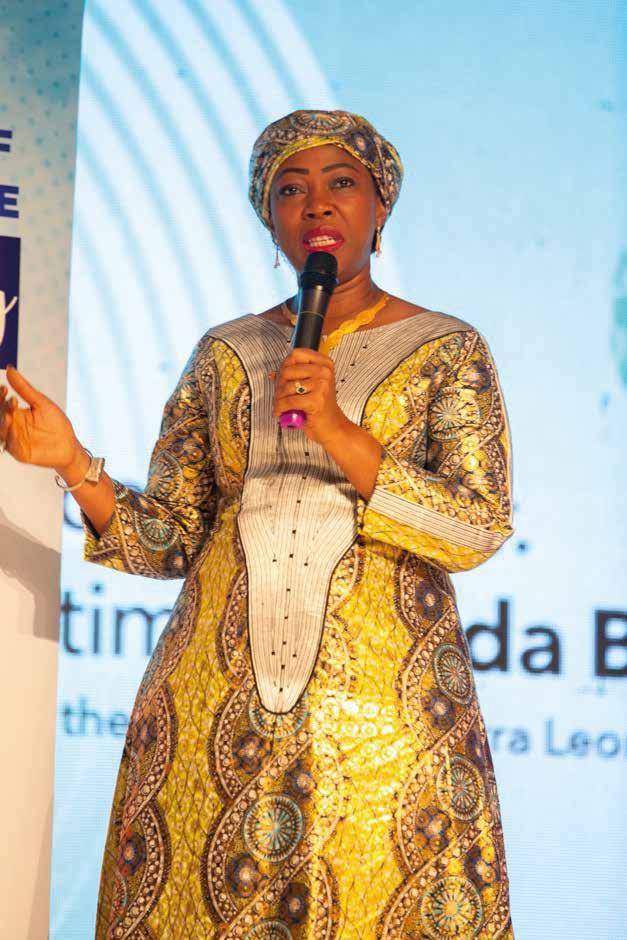

ago. Agile work models are no longer a buzzword; they are a necessity, especially in a fast-evolving economy like Ghana's. As remote work, flexible schedules, and tech-enabled collaboration become the norm, the question is no longer if businesses should
promise of agility, Ghanaian businesses must go beyond policy. They need to embrace the right technologies that power collaboration, automation, and innovation.
Here are five key technology trends reshaping the agile work landscape in Ghana and how
local businesses -
1. Collaboration technology – Driving connection across regions
Collaboration platforms like Microsoft Teams, Zoom, and Slack have become the digital meeting rooms of today. With Ghana's increasing remote and hybrid work culture, these tools
are more vital than ever.
Microsoft Teams, for example, is continuously upgrading its features. In 2025, new updates include real-time captioning, multi-language support, and AI-driven noise suppression – all designed to make virtual meetings feel just as natural as face-to-face ones. Whether your team is spread across Accra, Tamale, or even working from home in Cape Coast, these tools allow seamless interaction, document sharing, and productivity tracking. For Ghanaian firms with regional staff or diaspora consultants, it's a game changer.
2. Workflow automation – Streamlining efficiency for growth
Agile working is about speed and precision. Workflow automation allows businesses to preempt delays, reduce
human error, and optimise time.
Picture this: customer service queries are automatically triaged and routed to the right agent; invoices are processed without human intervention; reminders are scheduled and sent without anyone lifting a finger. This is already happening in Ghana's banking, telecom, and e-commerce sectors. Although the initial investment in automation may seem steep, it saves money long-term by reducing the need for extra staff and enabling your team to focus on strategic work that adds real value. More Ghanaian SMEs are exploring automation tools to handle inventory, CRM, payroll, and logistics.
3. Artificial Intelligence (AI): Empowering smart workplaces AI isn’t about robots taking over. In the Ghanaian work-
place, it’s more about making employees more effective and freeing them from repetitive tasks.
Take Intelligent Virtual Agents (IVAs), which can handle basic enquiries such as "What are your working hours?" or "How can I reset my password?" These bots never get tired, never forget a script, and offer round-the-clock support. That frees up your human staff to focus on complex customer interactions or business growth initiatives. From fintech to online learning platforms in Ghana, AI is helping create more responsive, scalable customer service experiences.
4. Workforce optimisation – Enabling productivity anywhere Ghanaian profes-
sionals, especially younger talent, are demanding flexibility. Agile work is about trusting your team to deliver results, not clock hours. Workforce optimisation tools help managers measure productivity, allocate resources efficiently, and spot performance gaps –all without micromanaging. With real-time dashboards, timesheet automation, and performance tracking, these platforms are helping businesses operate smarter. More importantly, they help reduce burnout, boost employee engagement, and improve retention – critical in Ghana's competitive labour market.
5. Ditching legacy tech – It’s time to let go
Holding on to out-
dated systems is one of the biggest roadblocks to agility. Yet, many organisations in Ghana still rely on legacy tech – whether it's paper records, old software, or obsolete hardware. The cost? Increased security risks, reduced speed, and an inability to integrate with modern platforms. In fact, clinging to legacy tech makes it harder to attract younger employees, who expect digital-first environments. Now is the time to upgrade your infrastructure, migrate to cloud services, and equip your team with tools that support modern workflows.
The global phase-out of legacy systems is accelerating, and Ghanaian businesses must not
be left behind.
Conclusion – The future of work is agile – and powered by tech
For Ghanaian businesses, agility is not just about flexibility – it’s about resilience, responsiveness, and relevance. Whether you're a startup in Osu or a mid-sized company in Kumasi, adopting the right technologies ensures you stay competitive in a digital-first economy. By investing in collaboration tools, embracing automation and AI, optimising workflows, and letting go of legacy systems, businesses in Ghana can create environments where talent thrives and customers stay loyal. Work smart. Work agile. Work with the future in mind.
>>>the writer is a seasoned cloud architect and sys-
tems administrator with expertise in leading technical teams to create innovative platforms. As CTO of eSolutions Consulting, he has spearheaded major projects like the Office 365 rollout for Ghana’s government and infrastructure deployment for the Ghana Revenue Authority. Recognized for his strategic use of emerging technologies, Allen has led his team to multiple Microsoft Partner of the Year awards, solidifying his role as a key leader in tech-driven business transformation. If you'd like to explore how these strategies can help your organization thrive, reach out to discuss tailored solutions for your business growth journey. He can be reached via allen@esolutionsghana.com and or 0540123034

Ananpansah Bartholomew Abraham
For many resource-rich nations, the ultimate aspiration is to transcend the cyclical trap of the “resource curse,” a paradox often attributed to the “Dutch disease." This phenomenon arises when revenues generated from the extractive sector, particularly hydrocarbons ( petroleum), distort the domestic economy by increasing demand for imports over domestic goods (“spending effect”) and shifting labor and capital away from other key sectors such as agriculture and manufacturing ( “resource pull effect”). The resulting imbalance often leads to weakened economic linkages, volatile commodity markets, and long-term macroeconomic instability. Mehlum et al. (2006) observed that resource-rich na-
tions such as Nigeria, Angola, Zambia, Sierra Leone, Saudi Arabia, and Venezuela have experienced slower or stagnant growth compared to resource-poor yet industrially successful countries such as South Korea, Taiwan, Hong Kong, and Singapore.
As a general principle, natural resource endowments,particularly petroleum, can serve as catalysts for national development if exploited efficiently and managed prudently. Petroleum refers to naturally occurring deposits of hydrocarbons, including crude oil, natural gas, and natural gas liquids formed over millions of years through geological processes. Ghana, having only commenced commercial hydrocarbon production fifteen years ago, is
still in the formative stages of determining its long-term trajectory ( success or failure) in this sector.
Historical Overview of Ghana’s Oil and Gas Sector:
Ghana's emergence as an oil-producing nation was officially marked in December 2010 with the commencement of commercial production from the Jubilee Field, located offshore in the Tano-Cape Three Points Basin. This milestone followed the 2007 discovery and drilling of the Mahogany-1 well by a consortium comprising Kosmos Energy, Anadarko Petroleum Corporation, Tullow Ghana Limited, Sabre Oil and Gas Holdings Limited, the EO Group, in conjunction with the Ghana National Petroleum Corporation (GNPC).
The Jubilee Field, located approximately 75 miles offshore, is considered one of the largest offshore discoveries in West Africa, with estimated recoverable reserves of between 600 million and 1.8 billion barrels of high-quality light crude (37.6 API), and approximately 800 billion cubic feet of natural gas (Kapela, 2009). In addition to Jubilee, Ghana has since brought two other fields TEN and Sankofa Gye Nyame (SGN)—into production, from a total of approximately 25 offshore discoveries.
Petroleum resources in Ghana are located within four sedimentary basins: the Western Basin (Tano to Cape Three Points Basin), the Central Basin (including the Saltpond Basin), the Eastern Basin(Ac-
cra-Keta Basin), and the onshore or inland Voltaian Basin.
Following the 2007 discovery and with full awareness of the risks posed by the Dutch disease, Ghana adopted a comprehensive institutional and legislative framework to govern upstream and midstream operations. These frameworks were modelled on international best practices, particularly those of Norway, Timor-Leste, and Trinidad and Tobago. While commendable progress has been made, structural and implementation challenges persist and must be addressed especially in light of the recent commercial discovery at Eban-Akoma.
Recent Seismic Surveys and the Eban-Akoma Discovery:
On July 3, 2025, Ghana’s Minister for Energy and Green Transition announced the successful appraisal and commercial viability of hydrocarbon deposits at the Eban-1X (oil) and Akoma-1X (gas and condensate) wells. These wells are located in the Cape Three Points Block 4 (CTP-B4), and their confirmation marks a significant advancement in Ghana’s upstream sector.
The joint venture responsible for this exploration and appraisal comprises Eni Ghana Exploration & Production Ltd, Vitol Upstream Tano Ltd, Woodfields Upstream Ghana Ltd, and GNPC’s subsidiary, Explorco, operating in collaboration with the GNPC itself.
Constitutional and Legal Framework: Resource Ownership and Citizen Empowerment.
Under Article 257(6) of Ghana’s 1992 Constitution, all natural resources, including petroleum, are vested in the President on behalf of
and in trust for the people of Ghana. Section 3 of the Petroleum (Exploration and Production) Act, 2016 (Act 919) reiterates this point, reinforcing the notion that these resources are public assets and owned by the people of Ghana
However, the enforceability of this constitutional trust was tested in Adjaye & Others v. Attorney-General & Annor (Suit No. C144/94) where the court held that the trust created was not enforceable in the law court. The Court, in arriving at this decision, relied on Tito v. Waddell (No. 2) [1977] to hold that the trust created under Article 257(6) was not judicially enforceable since it was not in the nature of a fiduciary relationship(trust in the lower sense). Rather, it represents a higher political trust that is executed through governance mechanisms(trust in the higher sense). To check executive authority, Article 268(1) of the Constitution mandates parliamentary ratification of any contract involving the grant of rights for resource exploitation. A
two-thirds majority in Parliament may exempt certain contracts under Article 268(2). In Republic v. High Court, Ex Parte Exton Cubic (2019), the Court underscored the necessity of parliamentary oversight as a proxy for the people’s approval, reinforcing democratic accountability in resource governance.
Institutional and Legislative Frameworks for Upstream and Midstream Petroleum Operations:
Although a detailed evaluation of the adequacy of Ghana’s petroleum legislation is necessary, it is broadly acknowledged that the current legal framework is robust. The key issue lies in addressing the structural and implementation deficiencies.
The core legal instruments governing Ghana’s oil and gas sector, especially the upstream and midstream petroleum operations, include:
1992 Constitution of Ghana.
GNPC Act, 1983 (PNDCL 64) Petroleum Commission Act, 2011 (Act 821). Petroleum Revenue Management Act, 2011 (Act 815), as amended by Act 893 (2015) Petroleum Exploration and Production Act, 2016 (Act 919). Petroleum Income Tax Act (PNDCL 188). Model Petroleum Agreement (MPA).
A. Petroleum Commission: regulating the Upstream Sector.
The establishment of the Petroleum Commission under Act 821 and in accordance with article 269 of the 1992 constitution marked a significant shift in regulatory governance. The Commission assumes responsibility for oversight of upstream activities, thereby eliminating the conflict of interest previously associated with GNPC's dual role as regulator and operator.
In addition to regulating upstream operations, the Commission promotes local content, enforces health, safety, and environmental standards, and en-
sures that petroleum activities contribute meaningfully to national welfare.
B. Petroleum Exploration and Production Act (Act 919):
Act 919 provides a comprehensive legal regime for managing petroleum exploration, development, and production. It defines the contractual relationship between the State, GNPC, and investors, prioritizing transparency, sustainability, and national interest.
Sections 5 and 11 prohibit petroleum operations without a formal agreement, except by GNPC. The Act mandates transparency and accountability (Section 4), empowers the Minister to demarcate Ghana's sedimentary basins into blocks, allocate those blocks (Section 6), and restricts share transfers exceeding 5% without ministerial approval.
The State, through GNPC, has the right to acquire up to 15% carried interest during exploration and development (Section 10.14), with
an option to increase its stake to 25% following a declaration of commercial discovery, safeguarding public interest in strategic resources.
C. Petroleum Revenue Management Act (Act 815, as amended):
This Act was enacted to ensure the transparent and sustainable management of petroleum revenues. Its objectives include prudent fiscal management, intergenerational equity, and public accountability in accordance with Article 36 of the 1992 constitution.
Key provisions include:
1. Petroleum Holding Fund (PHF): Established at the Bank of Ghana to receive and disburse all petroleum-related revenues.
2. Public Interest and Accountability Committee (PIAC): A citizen-led statutory body that ensures citizen engagement, oversight, and regular reporting on the use of petroleum
revenues thereby, deepening transparency and accountability.
3. Investment Advisory Committee (IAC): Develop a benchmark portfolio and advise the Minister on investment strategies for the Ghana Petroleum Funds, ensuring fiscal responsibility and reducing the risk of mismanagement.
4. Ghana Petroleum Funds (GPF): Comprising the Ghana Stabilization Fund (GSF) and Ghana Heritage Fund (GHF), these are strategic instruments for savings and stabilization ( investment).GHF for instance secures the development of future generations through savings when the petroleum reserves are completely depleted.The GSF on the other hand, is to cushion and sustain public expenditure in times of un-anticipated petroleum revenue shortfall.They (GHF and GSF) are to be consolidated into the Ghana Petroleum Wealth Fund one year after the depletion of
reserves.
5. Annual Budget Funding Amount (ABFA): Allocated to priority development areas under a medium-term framework, with a minimum of 70% earmarked for public investment and 25% for the Ghana Infrastructure Investment Fund (GIIF)
6. Exceptional Transfers: Permitted for specific purposes, including tax refunds and community compensation.
Challenges and Implementation Gaps:
Despite the legislative strengths, several systemic challenges persist:
1. Over-reliance on ABFA for recurrent ( consumption-based) expenditures undermining transformative potential of oil revenue.
2. Weak linkages between petroleum and non-petroleum sectors.
3. Inconsistencies in ABFA-funded priority areas due to polit-
ical transitions.
4. Weak enforcement of accountability provisions leading to misuse and misapplication of earmarked funds.
5. Inefficiencies in project execution and evaluation.
6. Underfunding of the GHF, undermining intergenerational equity.
The Promise of the Eban-Akoma Discovery: Lessons and Policy Recommendations
As Ghana transitions towards commercial development of the Eban-Akoma fields, it is imperative to draw lessons from previous experiences and implement targeted reforms:
1. Establish a Sovereign Petroleum Investment Authority, modelled after Norway’s Government Pension Fund Global, to manage petroleum revenues independently and professionally.
2. Implement a long-term development framework for ABFA utilization
under the National Development Planning Commission.
3. Amend the PRMA to curtail ABFA usage for recurrent expenditure and prioritize infrastructure and essential services delivery in health, education, roads, and highways.
4. Enforce stricter legal sanctions for financial mismanagement, breach of investment rules, delays, and reporting failures.
5. Strengthen PIAC’s mandate with investigative powers and enhance community monitoring capacity for projects executed with petroleum revenue to foster grassroots accountability.
6. Unify political consensus on petroleum governance to depoliticize strategic decisions, as was the case under the Norwegian model.
7. Promote local content and participation, as stipulated in L.I. 2204, to enhance state control and inclusive benefits.
Conclusion: The aspiration of every resource-rich
country is to avoid the resource curse and transform its resource wealth into sustainable national development. Ghana’s early efforts through legislative innovation and institutional establishment have laid a solid foundation. However, the recent Eban-Akoma discovery presents a timely opportunity to reinforce these gains through reforms that promote efficiency, accountability, and long-term national welfare. Strengthening enforcement, ensuring fiscal discipline, and committing to intergenerational equity will be
critical in transforming Ghana’s petroleum wealth into a blessing, not a curse.
Sources:
1. Public Interest and Accountability Committee (PIAC) 2024 Semi-Annual Report
2. Petroleum Revenue Management Act, 2011 (Act 815) as amended by Act 893 (2015)
3. Petroleum Exploration and Production Act, 2016 (Act 919)
4. Springfield Group – Offshore Discovery
5. PIAC – Oil Production Decline
6. Kwesi Dart ey-Baah et al. “Emerging Dutch Disease in Emerging Oil Economies na’s Perspective”
7. “Model of State Management of Petroleum Sector Case Study of Norway,” Interdisci plinary and Political Science Journal, Vol. 20, No. 1/
About the author
Ananpansah Bar tholomew Abra ham(AB) Freelance Journalist | MSc Oil and Gas Resource Manage ment
Contact: 0241129910 / 0200704844



more fairs regularpotentially every quarter.
“We also hope to collaborate with major supermarkets in the future. The goal is to have FTF shelves in stores, so anyone can walk in, pick up an item, and know they’re supporting a good cause.”
On the importance of reading, Ms. Sanie emphasized the value of literacy for children’s development, stating:
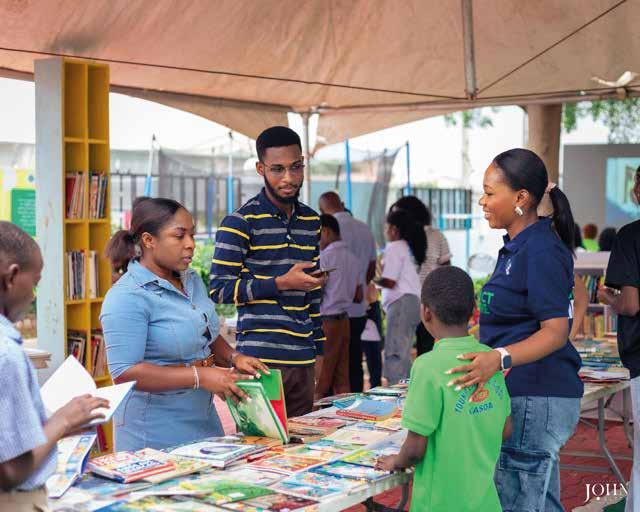
“Reading is key. It fuels curiosity and opens up a world of knowledge. If we
want children to have a bright future, we must first empower them through books.”
For The Future (FTF) is a youth-led nonprofit that has impacted over 8,000 children across Ghana and Nigeria through education, mentorship, and sustainable development initiatives. Since its founding in 2016, FTF has worked to provide access to opportunities, holistic education, and essential resources for underprivileged children, ensuring they receive the support they need to succeed.

Togbi Azadagli IV has been installed as the new Like Fia of Tegbi, bringing new hope and excitement to the Tsrimega Royal family and the entire Tegbi community of Anlo in the Volta Region. This highly anticipated event has been marked with colorful celebrations and traditional rituals, showcasing the rich cultural heritage of the Anlo people. The installation of Togbi Azadagli IV reflects the strong bond between the community and its leaders, and is a testament to the unwavering support and respect for the Tsrimega Royal family. Anlo, located in the Volta Region of Ghana, has a long history dating back to the 15th century. The community is known for its vibrant culture and traditions, which have been preserved and passed down through generations. The Tsri-
mega Royal family has been at the helm of leadership in Tegbi, with each successive Like Chief playing a crucial role in the development and progress of the community. The installation of Togbi Azadagli IV is a significant milestone in this long lineage of leaders.
Togbi Azadagli IV, Agbotadua Abotsi and Mama Deawofe II of Tegbi, bring a unique blend of experience and passion to the role of being leaders of the Like Clan of Tegbi. Born and raised in Anlo, Togbi Azadagli IV has a deep understanding of the community and its people. He has also spent many years working in various positions of leadership, gaining valuable skills and knowledge that he now brings to his new role. His installation has been well received by the community, with
many expressing their confidence in his ability to lead Likeawo and Tegbi Dua to greater heights.
As Togbi Azadagli IV takes on the mantle of Likeawo, he has outlined his vision and plans for the community. He aims to continue the progress made by his predecessors in areas such as education, healthcare, and infrastructure. He also intends to promote unity and collaboration among the different clans and families in Anlo, emphasizing the importance of working together for the greater good. Moreover, Togbi Azadagli IV is committed to preserving the cultural heritage of Anlo and promoting its rich traditions and practices to the rest of the world.
The installation ceremony of Togbi Azadagli IV was a grand affair, attend-
By Attipoe Shine NUTEPE
ed by dignitaries, community leaders, and the general public. The event was a celebration of the rich history and culture of Anlo, with traditional music, dance, and rituals being performed.
The Tsrimega Royal family was at the forefront of the ceremony, showcasing their vibrant and colorful attire. The atmosphere was one of joy and excitement, as the community welcomed their new Like Fia with open arms.
Dusifiagah of Anlo Dukor Togbi Gbordzor, Torgbi Kposegee of Anyako, Togbi Hatsu and the various chiefs from
the three wings of the Anlo Dukor were heavily represented in their full regalia.
The installation of Togbi Azadagli IV as the new Like Fia of Tegbi-Anlo marks a new era of leadership and progress for the community. His strong ties to the community and his vision for a united and prosperous Tegbi and Anlo Dukor have already garnered widespread support and admiration. As he leads with a strong and confident tone of voice, Torgbui Azadagli IV is poised to elevate Tegbi and Likeawo to greater heights and preserve its rich cultural heritage for generations to come.


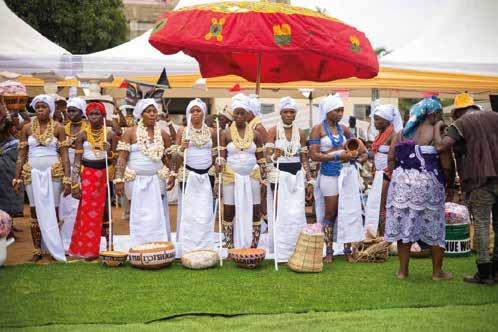


Smirnoff has always been the life of the party , the spark that brings people together, the flavour that turns moments into memories, and the brand that lets everyone show up exactly as they are. That energy hit a whole new level when Smirnoff took
over Joy FM Street with the Smirnoff In The Mix Street Edition,a wild collision of music, flavour, and street culture that lit up the city to honour Guinness Ghana’s 65th anniversary. In just five editions, Smirnoff In The Mix has quickly become
the space where the life of the party truly comes alive. But until now, those nights were invite-only. Hidden locations, curated guest lists, a little mystery , the kind of experience you had to be in the know to catch. A Lineup That
Brought Fire to the Street
The DJ lineup was stacked with some of Ghana’s finest , the same DJs who’ve proven time and again they don’t just play at the party, they make the party. DJ Wallpaper, DJ Lord OTB, DJ Phantom, DJ Mish, Chichi
DJ, DJ Nyce, AD DJ, and Merqury Quaye each brought their own flavour, turning Joy FM Street into a non-stop wave of Afrobeats, amapiano, hip-hop, and unexpected moments. The energy never dipped ,smooth
transitions, wild drops, and a crowd that stayed locked in from start to finish.
Performances
That Lit Up the Night Surprise performances kept the crowd locked in all night. Wendy Shay lit up the stage with back-to-back hits, the crowd singing every word. Kojo Blaq and DJ Wallpaper brought a seamless blend of live vocals and decks, while Jay Wilder followed with sharp
bars and street-fuelled energy that had the whole place vibing. Pure, unfiltered talent , the crowd soaked it all in.
When the Feeds Met the Street Ghana’s favourite creators pulled up too. Bensontheactor, Cookie, Sikaofficial, Paradise, and more blended effortlessly into the crowd, capturing real moments, dancing with fans, and turning the heart of the celebration into pure, unfiltered content.



Smirnoff Pulls More Surprises
The crowd got their first taste of Smirnoff Spicy Tamarind, sweet, fiery, and guaranteed to heat up your night. It turned heads on the street, and soon, it’ll be heating up shelves at your favourite spots too.And the surprises didn’t stop there. The sleek new Smirnoff Ice Pineapple Punch and Smirnoff Ice Double Black cans also made their debut, easy to
crack open, easy to enjoy, with that crisp edge Smirnoff Ice is known for.
Beyond the sound and sizzle, the night came with a surprise twist , a curated countdown of 65 iconic songs, each one signalling Guinness Ghana’s 65 years of boldness, now translated into sound. Track after track, the vibe kept building, the street kept moving, and as the final song dropped, confetti


filled the air , music, people, and pure party energy colliding in the best way. But that’s what made the night special, different flavours of people, each bringing their spark, their style, their energy. And somehow, it all just clicks,creating one refreshing, unforgettable vibe.That’s exactly what Smirnoff means when we say We Do We.It’s about showing up as you are, adding your flavour to the mix, and watching the whole night come alive.




Eni declares commerciality for Eban-Akoma discoveries
Eni Ghana has sub-
mitted a Declaration of Commerciality for its Eban-Akoma oil discoveries, marking a significant step towards development. As operator of the joint venture, Eni will work with the Ghana National
Petroleum Corporation and other stakeholders to develop a plan for the fields.
This move underscores the potential for increased investment and production in Ghana's oil sector. Let's dive deeper into the implications.
